Mendel to Mendel: Brandon Uranowitz and Chip Zien on the Thrill of Falsettos
A leading player of this new Broadway revival sits with a star from the original production for a walk down memory lane.
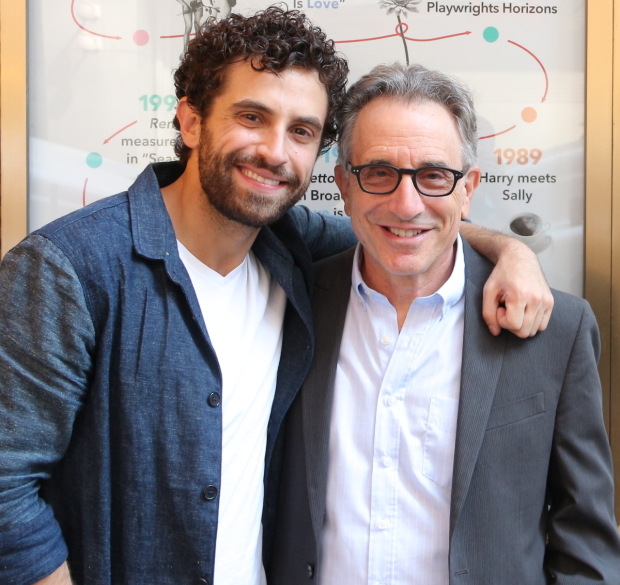
(© David Gordon)
The two men had only sat down a few minutes before Brandon Uranowitz asked Chip Zien a loaded question. Longtime admirers of each other's work, they only knew each other tangentially, but this meeting at TheaterMania's office was the first time they were able to discuss business.
"I want some advice," Uranowitz, a Tony nominee for An American in Paris, says to Zien, whose career-defining performances include the Baker in Into the Woods and Mendel in Falsettos, the topic at hand.
"Don't drink after half-hour," Zien jokingly deadpans, without missing a beat.
Uranowitz looks slightly confused, perhaps waiting for more. "OK…"
Zien smiles. "I have no advice. When I heard you were cast, I was just overwhelmed. You opened American in Paris standing on the stage of the Palace all by yourself. I thought it was one of the coolest things I've seen in a long time."
In the new Broadway revival of William Finn and James Lapine's Falsettos, one of the landmark musicals of the 1990s, Uranowitz has picked up the neurotic-Jewish torch from Zien, taking on the role of Mendel in Lincoln Center Theater's production at the Walter Kerr Theatre. Uranowitz first discovered the show through its various cast albums; Zien was there at the very beginning of the project's genesis in the late 1970s.
"It was unlike anything I had ever done and unlike anything I've ever done since," Zien says. "The rawness and wildness of it. The combination of Lapine, who was organized and focused, and Bill Finn, who's just this raw—"
"He's like a bottomless pit of raw, crazy, unique ideas," Uranowitz notes. "That combination of the two of them created—"
"Something that was profoundly wonderful."
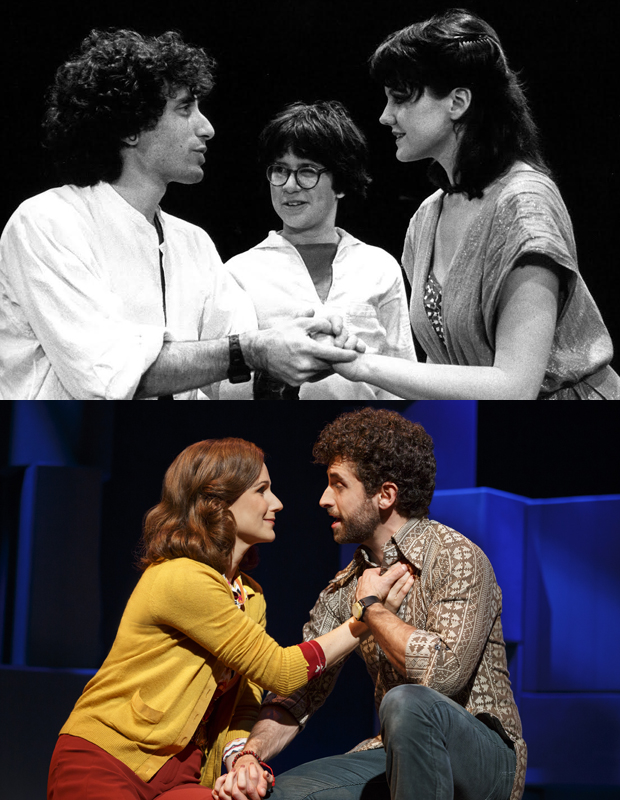
(© Susan Cook/Joan Marcus)
A lot of classic musicals have important legacies — or at least rabid fan bases willing to make that assertion — but Falsettos is particularly up there in the pantheon. It wasn't the first Broadway show to have gay characters, but, predating Angels in America and Rent, it was one of the earliest to deal head-on with the ravages of the AIDS crisis and the effects it had on not just the victims, but also their families. "We have something very special to honor," Uranowitz says, not taking his job lightly. "We all feel so passionately about honoring you guys and what you created."
"You're gonna be better than we were," Zien assures him. "We just jumped around for a living," he says of Lapine's original production, a lovably scrappy affair that didn't even have a choreographer. "You guys know what you're doing. I don't know what a stickler they'll be for harmonies, but if you look at the score, we weren't always singing that. I saw a video of you singing "chop chop chop chop" [in "This Had Better Come to a Stop"]. It's a weird triplet thing off the beat. I could never get it. I was looking at it going, 'Damn it, that's fantastic.'"
Falsettos premiered at the John Golden Theatre in 1992. A combination of two earlier off-Broadway musicals, the first act (1981's March of the Falsettos) follows Marvin as he struggles to create a "tight-knit family" after leaving his wife and son to live with another man. The second half (1990's Falsettoland) picks up several years later as Marvin's son Jason prepares for his bar mitzvah, while Marvin's lover, Whizzer, begins to suffer from a mysterious disease that is suddenly affecting scores of young gay men.
Zien was on hand for all three versions, as well as an earlier one: In Trousers, a precursor that debuted in 1979. "Billy [Finn] thinks it's not even good writing," Zien says of the piece, which was the theater world's first introduction to the sexually confused Marvin. "But there is a school of thought that it's some of his very best. It's the most raw."
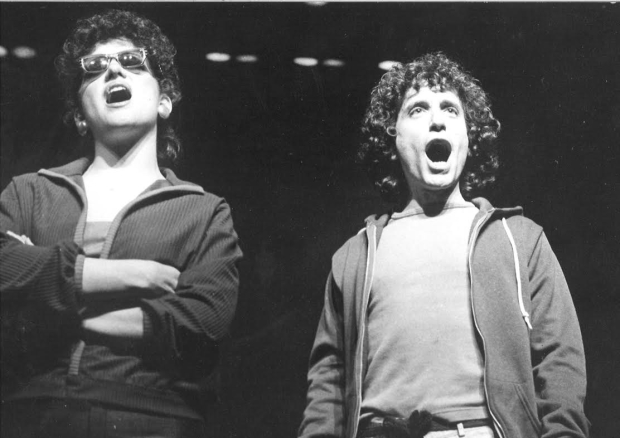
(© Susan Cook)
Upon the premiere of In Trousers at Playwrights Horizons, Zien played Marvin himself. But when the sequels took shape, he saw his role shifting before his very eyes. Suddenly, Zien became Mendel, Marvin's psychiatrist who eventually falls for Marvin's ex-wife, Trina, and becomes another father figure to his son, Jason. "It was horrifying," Zien recalls. Finn "took me out to lunch and he said, 'We're gonna do March of the Falsettos, but you're gonna be playing Mendel.' I said, 'No I'm not. I play Marvin. Who's Mendel?' Obviously, it worked out."
And yet, there was still something to be desired. "I'm telling you, Brandon, I messed it up for you," Zien continues with a laugh. "I still think to this day that [the song] "Unlikely Lovers" is about the wrong four people. It always bugged me. I had huge fights about it."
Clearly, their sensibilities are simpatico. "Where's the big, sweeping Mendel-Trina duet?" Uranowitz wonders. "Exactly," Zien replies, smiling. "When 'Everyone Hates His Parents' came in, that was essentially reparation. But I wanted a ballad."
One of the most beautiful aspects of the Falsettos experience for both men is how it created a new family offstage. "I was talking about this with Christian [Borle, who now plays Marvin]," Uranowitz says. "I don't know what it is about this show, but as soon as we walked in the room, we were inseparably close."
"I'm so glad to hear that," Zien says. "We all grew up together. Partners came and went. Children were born. We kept coming together over an extended period of time. That's part of what was so unique."
"We've all fallen in love with each other, and it happened immediately," Uranowitz adds. "You guys created something pretty magnificent that has that effect not just on the audiences, but the people doing it. I feel like we will now be friends forever."
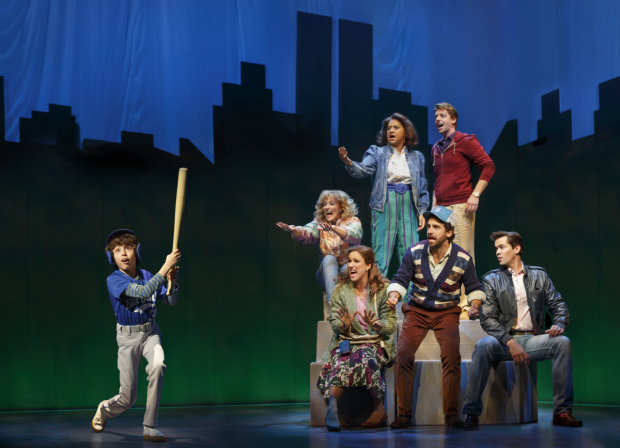
(© Joan Marcus)
Uranowitz has one last question for his predecessor, one that he may already have decided on an answer to, but wants confirmation from the guy who was there from the start. "Did you feel that Mendel was, or is, a pillar for these people?"
"I did. I felt part of my function was to be that source of hope and strength."
It's evident that Falsettos means a lot to both men. "I saw Christian and Andrew [Rannells, who plays Whizzer] sing "Thrill of First Love" at a benefit," Zien remembers, "[and] this is really embarrassing, but I started sobbing. It was so beautiful."
"Bill has this brilliant way of articulating the untapped emotions of particular moments," Uranowitz contends. "It catches you off guard and surprises you. Watching Christian sing "What Would I Do" the first time kind of killed me. It's like a wave of emotion, and then I have to come out and put a little bow on the show, which was really hard a couple of times."
"It is hard," Zien says reassuringly. But that difficulty isn't something to fear. As tough as Falsettos was to perform, especially the last few scenes, "I felt a little more joyful after the finale. It is quite sad, but there's a sense of joy about it. And value. Falsettos is the only show that I ever opened where I didn't worry so much about the critics. There was something about how close we all felt, and how much we loved doing the piece, that it transcended the normal concerns. Our involvement seemed so deep and rich, which you don't always have."
Elder Mendel looks at younger Mendel seated across the table. "All of us, the old guys, are so flattered at who has been [cast]."
"And we're over here being like, 'I have impossibly large shoes to fill,'" Uranowitz says. "I'm curious to see what this experience will be like for you guys."
"We're over the moon," Zien concludes. "And really excited."
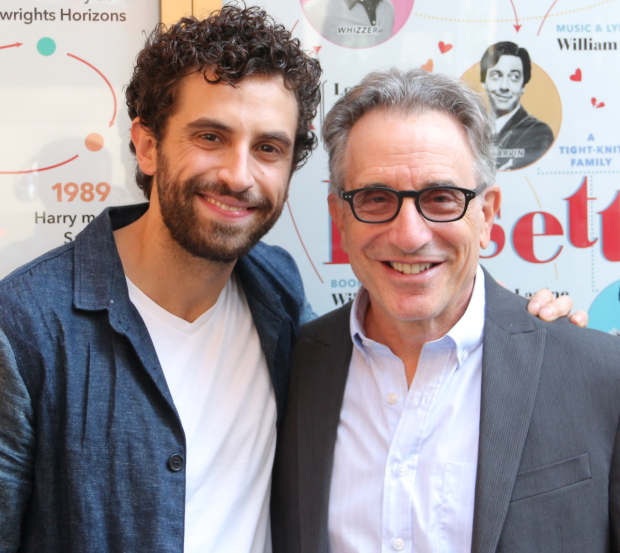
(© David Gordon)








